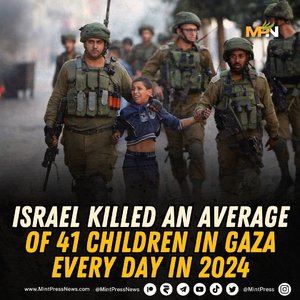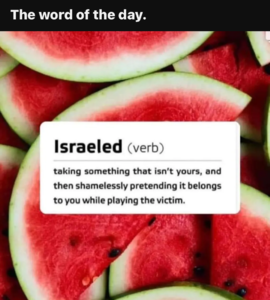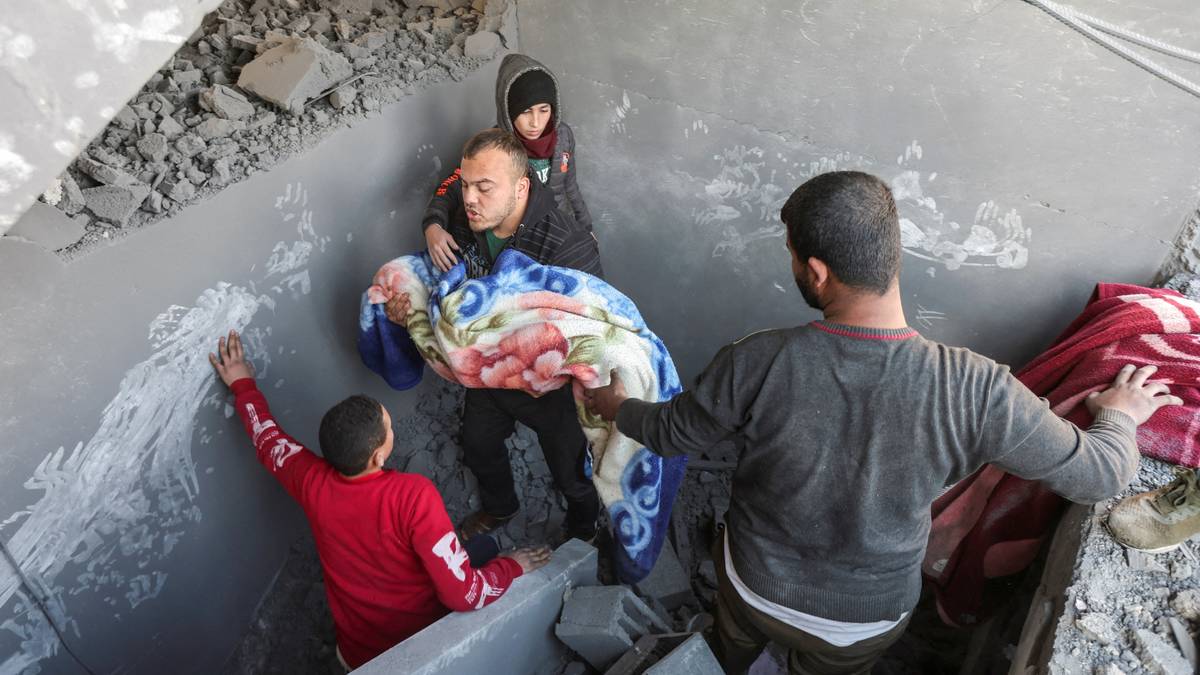As a psychologist dealing with brutality in the military, I see how the Israeli government's rhetoric of hatred is worsening the problem
Concern for the safety of family members serving in the army is part of family life in Israel. Like my contemporaries,
I was a worried father when my children served in the Israel Defense Forces (IDF), and I am a more worried grandfather.
I am horrified by
the mass killing of civilians in Gaza and I am disturbed the impact of this brutality on soldiers' mental health.
Our soldiers are imperiled by the government's
inflammatory rhetoric and weakening of the civilian and military justice systems.
These policies undermine the IDF's code of conduct, support atrocities and increase the risk of moral injury.
Moral injury occurs when soldiers act against their moral values and beliefs or participate as bystanders. Those injured in this way experience guilt and shame, and are prone to depression, anxiety and suicidal impulses.
The IDF provides month-long intensive treatment to traumatized soldiers, some of whom have been morally injured, in Rear Rehabilitation Centers (RRCs). Subsequently, half of these soldiers are discharged as unfit for military duty.
Israeli society views the IDF as
a moral army. The discussion of atrocities evokes emotional resistance even though it is intellectually understood that crimes exist in every civilized society and that war crimes have been committed by soldiers in every army.
Developmental psychologists have identified callous traits in young children while social psychologists have demonstrated that authoritative directives and social pressure lead ordinary people to harmful behavior.
Still, it is difficult to face the violence of callous soldiers and the brutalization of ordinary soldiers. Therefore, I am not reassured when my grandson says: "Don't worry, Grandpa, I will refuse an illegal order."
I want to protect him and all others who are risking their body and mind when they serve in the IDF. I want them to know how difficult it is to stand up to a callous commander and to resist peer pressure encouraging brutality.
I want them to know about the slippery slope of brutalization and get educated about the moral dilemmas they will face during wartime. This motivated me to write this essay both as a grandfather and as a psychologist who has researched soldiers' experience with brutalization.
Nuphar Ishay-Krien was the social welfare officer of two mechanized infantry companies stationed in the southern Gaza Strip during the first intifada (1987-93). She talked with the soldiers and they opened up to her. Four years later, I supervised her graduate research study of the companies' brutalization.
She used confidential interviews to explore the moral drift, the brutalities and the consequent mental health issues. Our scientific article was later published as the first chapter in an edited book "The Blot of a Light Cloud: Israeli Soldiers, Army, and Society in the Intifada" in 2012.
The subsequent chapters reflected and expanded on our research. They were written by an interdisciplinary group of scholars in mental health, sociology, law, political science, communication, and philosophy. There were also writers, artists, and high-ranking retired army officers..
We identified five groups of soldiers based on personality traits. 1. A small Callous group was composed of ruthless soldiers, some of whom confessed to violence before the draft. These soldiers committed most of the severe atrocities.
The power they received in the army was intoxicating: "It's like a drug ... you feel like you are the law, you make the rules. As if from the moment you leave the place called Israel and enter the Gaza Strip, you are God." They viewed brutality as an expression of strength and masculinity.
"I have no problem with women. One threw a slipper at me, so I gave her a kick here (pointing to the groin), broke all this here. She can't have children today."
"X shot an Arab four times in the back and got away with a self-defense claim. Four bullets in the back from a distance of ten meters ... cold-blooded murder. We did things like that every day."
"An Arab just walked down the street, about twenty-five years old, didn't throw a stone, nothing. Bang, a bullet in the stomach. Shot him in the stomach, and he was dying on the sidewalk, and we drove away indifferently."
These soldiers were remorseless and did not report moral injury. Some of them were convicted by military courts. They felt bitter and betrayed.
2. A small, ideologically violent group supported the brutality without taking part. They believed in
Jewish supremacy and were derogatory toward Arabs. Moral injuries were not reported in this group.
3. A small incorruptible group opposed the influence of the callous and ideological groups on the company's culture. Initially intimidated by brutal commanders, they later took a moral stand and went on to report the atrocities to the division commander.
Following discharge, most of them viewed their service as meaningful and strengthening. However, one whistle blower was severely harassed and ostracized, and it was necessary to move him to another unit. He was traumatized, depressed and left the country following discharge.
4. A large group of followers consisted of soldiers with no prior inclination to violence. Their behavior was most influenced by junior officers' modeling and the company's norms. Some followers who committed atrocities reported moral injuries: "I felt like, like, like a Nazi ... it looked exactly like we were actually the Nazis and they were the Jews."
5. The restrained was a large group of inner-directed soldiers who maintained military standards and did not commit atrocities. They responded to Palestinian violence and life-threatening situations in balanced and legally justified ways. They did not report moral injuries.
In each of the companies, an internal culture developed that was largely shaped by junior commanders and charismatic soldiers. Initially, the norms instigated atrocities.
"A new commander came to us. We went out with him on the first patrol at six in the morning. He stops. There's not a soul in the streets, just a little 4-year-old boy playing in the sand in his yard. The commander suddenly starts running, grabs the boy, and breaks his arm at the elbow and his leg here. Stepped on his stomach three times and left."
"We all stood there with our mouths open. looking at him in shock ... I asked the him: "What's your story?" He told me: These kids need to be killed from the day they are born. When a commander does that, it becomes legit."
A forceful intervention by the division commander transformed the two infantry companies. Following the report by the Incorruptible soldiers, he initiated an investigation that led to convictions.
Additionally, two of the Incorruptible soldiers were assigned to officers' training. When they returned to the companies as officers, they closely monitored the soldiers, kept strict discipline, and promoted an inner culture that was in line with the IDF's code of conduct.
There is much
evidence of alleged war crimes in the current war and it is easily accessible. Lee Mordechai, an Israeli historian, has been collecting, categorizing, and regularly updating the data. The data include reports by reputable institutions such as the United Nations, reporting by mainstream media outlets, and images, and videos uploaded to social media.
There is documentation of shooting of civilians waving white flags, abuse of individuals captives, and corpses, burning houses without legal approval, vengeful destruction of property, and looting. Additionally, Mordechai finds that "a miniscule number of investigations" have been opened "compared to the evidence for committed crimes".
My examination of the data indicated a similar grouping of soldiers with some significant differences. Most notably, the Callous and Ideologically Violent groups appear to be larger, more extreme and to act out their ideology in defiance of IDF's standards and the weakened justice system.
The
eulogies at Shuvael Ben-Natan's funeral, a reservist who was killed in Lebanon, illustrate this shift. One speaker referred to Ben-Natan's killing of a 40-year-old Palestinian who was harvesting olives with his children in the West Bank.
Members of his military unit recounted how he boosted morale in Gaza by setting a home on fire without approval. They professed their commitment to continue with arson and revenge in Gaza, Lebanon and Samaria.
As the corrupting influence of the Callous and Ideologically Violent soldiers increases, the Incorruptible are marginalized. Max Kresh, a reserve fighter, declared his opposition to participating in crimes against humanity like "flattening Gaza." The result was severe social ostracism: "They kicked me out of my team. They made it clear they didn't want me." He returned from reserve duty feeling "mentally crushed."
Sde Teiman, a detention facility, is like a microcosm of brutalization in the current war. It became notorious when an Incorruptible veteran physician
reported signs of severe sexual abuse in a detainee. Nine IDF reserve soldiers were subsequently detained on suspicion of aggravated sodomy and other forms of abuse.
According to media reports, there are 36 investigations regarding deaths of detainees who were held in Sde Teiman since October 7. Testimonies of released Palestinians gathered by the Israeli human rights NGO B'Tselem indicate harsh, arbitrary violence on a frequent basis, humiliation and degradation, deliberate starvation and other abusive practices. Soldiers
expressed anonymously how a discourse of hatred and revenge normalized the abuse of detainees.
A Restrained student in the reserves described brutalization and its effect on the Followers. "I saw sadistic people there. People who enjoy causing suffering to others. … What was most disturbing was to see how easily and quickly ordinary people can detach themselves and not see the reality right in front of their eyes when they are in a difficult and shocking human situation."
Similarly, a reservist doctor stated: "There is total dehumanization here. You don't really treat them as if they are human beings ... in retrospect, the hardest thing for me is what I felt, or actually what I didn't feel when I was there. It bothers me that it didn't bother me. There is normalization of the process, and at some point, it just stops bothering."
A Restrained female reservist kept her standards by escaping the facility: "The dehumanization scared me. The encounter with such dangerous attitudes, which has become more normal in our society, was traumatic for me ... I discharged myself from reserve duty with a psychiatrist's help."
Sde Teiman and the war crimes in Gaza need to be seen within the larger context. Israel went to war after the mass killing of civilians by Hamas and the uncovering of its genocidal intention.
Shortly thereafter, Hezbollah, which had been preparing the infrastructure for a parallel mass killing in the north, attacked our civilian population. They have been armed and joined by Iran, which has been openly stating its intention to annihilate the State of Israel and complete the "Final Solution" for Israeli Jews.
We felt weak and vulnerable as we reexperienced memories of the Holocaust, and we needed to defend ourselves against real threats to our existence. There were also dark feelings of rage and vengeance, and no empathy for the people of Gaza who rejoiced in the massacre of Jewish women and children.
Our children and grandchildren, husbands and wives, went into this war courageously, risking their lives with a comradeship that reflects what has been valuable and meaningful in our country.
It was the duty of our government and the senior command to lead our soldiers in battle, and to prepare them physically, mentally and morally for the particular challenges of this war. We needed leaders who would help us to courageously face our own darkness and strictly forbid a vendetta.
"War is a cruel thing," wrote Maj. Gen. (res.) Yaakov Amidror in "The Blot of a Light Cloud" and continued: "The real question is: how do you focus the cruelty on those who want to harm us and not on others who happen to be in the area."
In this context, our government's rhetoric of hatred and revenge, which has been reinforced by its determined undermining of the justice system, led to excessive retaliation and mass killing of civilians in Gaza. It provided a tailwind for atrocities by Callous and Ideologically Violent soldiers, increased their influence over the Followers, and sidelined the Incorruptible.
In this difficult situation, the senior command is responsible for upholding the values listed in the IDF's code of ethics, including purity of arms and discipline, which dictate: "IDF soldiers will not use their weapon or power to harm uninvolved civilians and prisoners" and "The soldier will ensure they are only giving out legal orders, and do not follow illegal orders."
By upholding these values, they can prevent brutalization against the innocent and protect the soul of our soldiers. We, the citizens who send our children, spouses and grandchildren to military service, must find ways of resistance. We are obligated to speak clearly in order to keep limits on the cruelty of war, to uphold our moral code, and to protect soldiers from moral injury and its long-term consequences.
Prof. (Emeritus) Yoel Elizur, The Seymour Fox School of Education, The Hebrew University of Jerusalem. Chairperson of the Council of Psychologists (2010-13). As a mental health officer in reserve, he was the chief supervisor of the IDF's RRC. Editor of "The Blot of a Light Cloud: Israeli Soldiers, Army, and Society in the Intifada" (Hebrew).

www.aftenposten.no




















